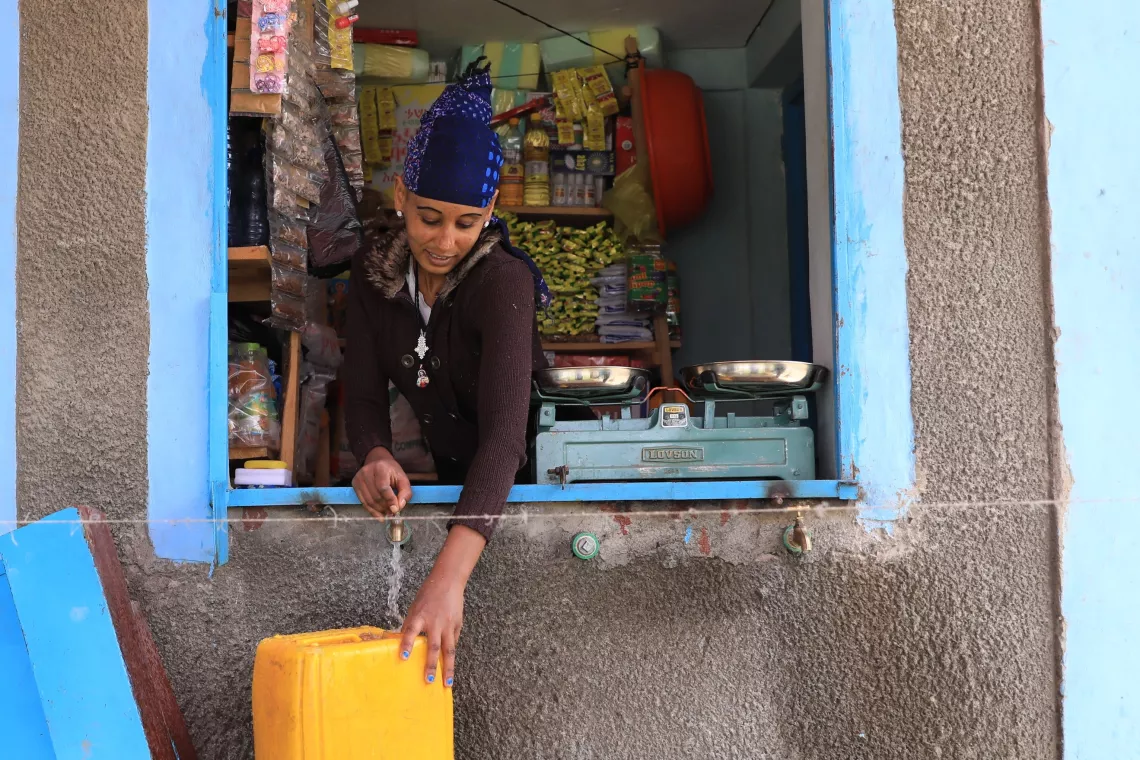Women and water, a very personal relationship
Sheno, Ethiopia,

When water is easily accessible to women, it transforms their lives. On average, women and girls around the world spend 200 million hours every day on collecting water. This women-water relationship seems obvious, but it is a personal one for many. Water is time, health and safety to women and girls in rural settings. Following our recent trip to the small town of Sheno, 80 km north of Addis Ababa, the capital of Ethiopia, we wrote this story on how water impacts the lives and livelihoods of women.

“There are happy days and sad days in my life,” says Belay Jima, a mother of six from Kombolcha Goro kebele (sub-district), in the outskirts of Sheno town. Her happiest day was when she got married 22 years ago. She also considers the birth of her three boys and three girls among her happiest moments.
But Belay has had her share of tragedies. Six years ago, she lost her husband and the responsibility of raising her children fell squarely on her. “That was the darkest day in my life. I was so devastated,” she says. Ever since, she has played the role of father and mother, working extraordinary hours on her farm and taking care of the children at home. Her firstborn, Sisay Eliku, quit school in grade 8 to assist his mother. “When I plough, he seeds. And when I get tired, he takes over,” says Belay. “But I feel bad that he had to forgo his education to support the family.”
As the years went by, Belay’s hard work began to pay off. She managed to build an additional room, which serves as a living room, and increased the number of sheep, cows and chicken, along with an abundant yield of crop and milk products she reaps every year.
Still, one vital necessity in her house was missing - water!

Belay and her children would fetch 16, twenty-liter jerry cans of water every day - four jerry cans for household use and the rest for the livestock. It was a daunting task, and, in the process, her second son hurt his back. It reminded her of her childhood when she grew up carrying water, which left her with a bump on her back where the heavy clay water container used to rest.
For years, Belay and fellow villagers used to get water from seasonal rivers and ponds. “It was dirty water. Both humans and cattle drank from there,” she says.
Later, a committee under Belay’s leadership was formed to spearhead a solution. They dug water well while the local government provided pipes and a handpump. This proved to be short-term relief. Though the water was available close by, during the rainy season, the well would be flooded and infested with leeches.
A more permanent solution was to follow following the completion of a new water supply project not far from Belay’s home. Under Belay’s coordination, 20 families contributed 1,000 Ethiopian birr each (US$ 37) to cover the cost of extending the pipeline to bring water to the center of the village. Belay did not end there. She sold one of her oxen for 25,000 birr and used the money to pay for the pipes, fittings and faucets, which cost almost 6,000 birr. Finally, her dream had come true. Water was available in her house. Some of her neighbors also followed suit in connecting water to their homes.
“My father used to say that a fool doesn’t consider water as food,” she says. “But water is everything. Look, I have water now next to my kitchen. I am a happy woman.”

What makes her even happier is the fact that people can have clean and safe water during the COVID-19 pandemic. Genzeb is proud to play a role.
The Sheno water supply is also a source of livelihoods for many women. Water kiosks - booths that sale tap water - are given to vulnerable women, especially those with disabilities. The women also sell various items in the kiosks to supplement their incomes.


Aberash Mengistu, a mother of three living with a disability, owns a kiosk near the town’s market. In addition to the water, she sells coffee and colorful handmade basketwork. “After my husband died, I was worried about my children,” she says. “But now with the water I sell and these items, I am able to support my family.”
Aberash is proud that her first daughter is soon to graduate from high school. “She is preparing well for the national exam. I bought her books and she is studying every day.”
Similarly, in the centre of town, 25-year-old Aberash Abebe, who became disabled after a childhood accident, runs a water kiosk. “I used my little savings to fill up my shop with merchandise,” she says. “I am also making money from selling water.” Aberash says early morning and late afternoon are the busiest when people come to fetch water. She plans to expand a little space in the back of her shop so that she can bake and sell ‘injera, the staple food of Ethiopia. She already bought the stove with her savings.




